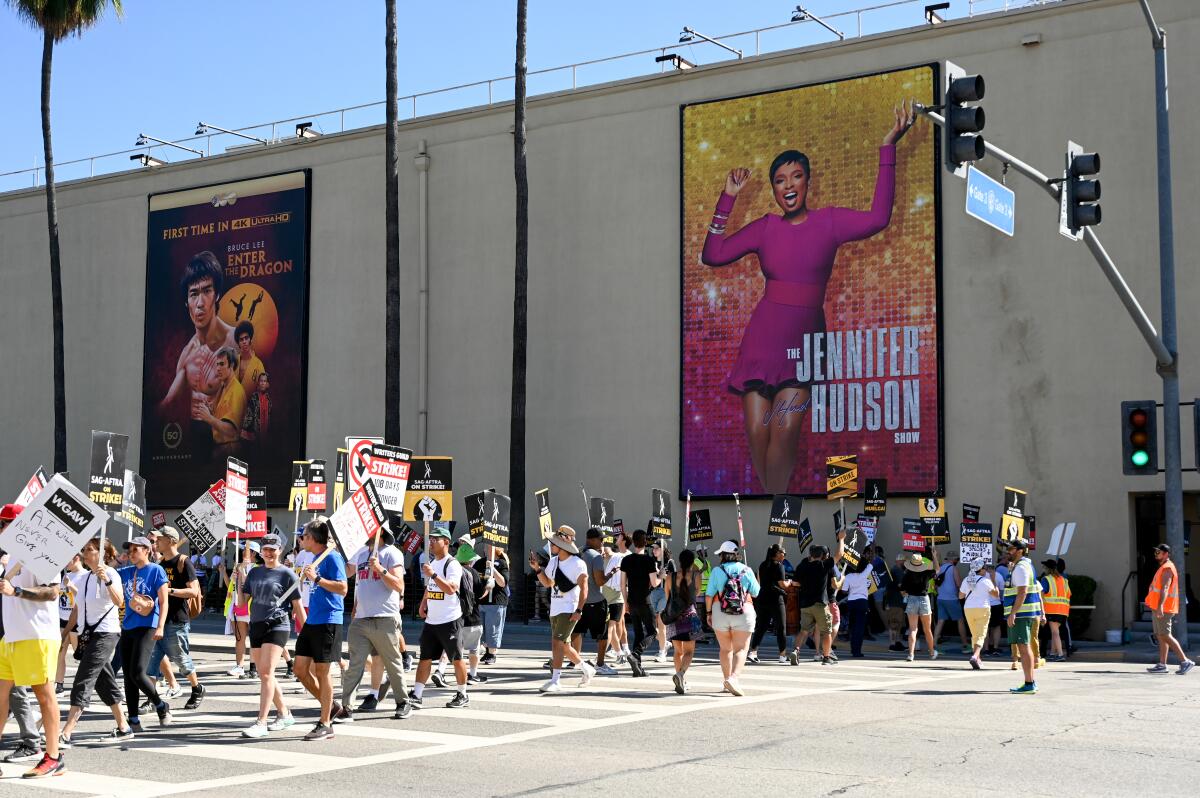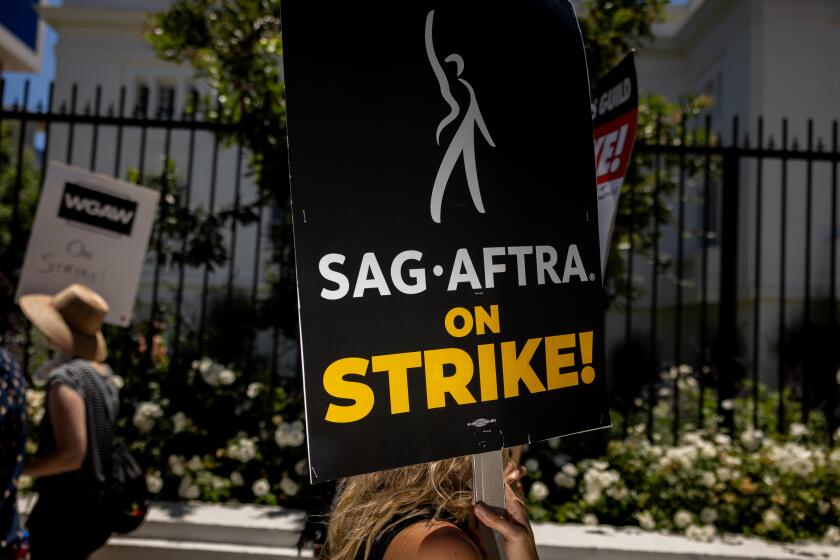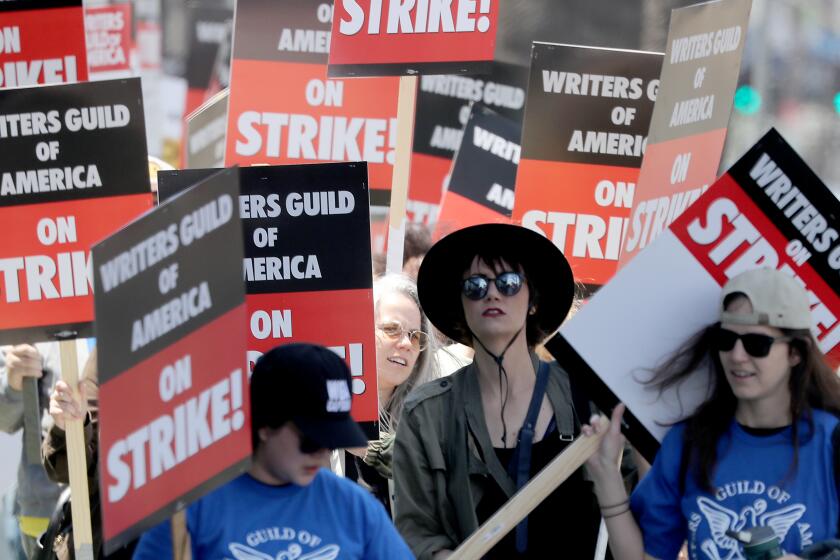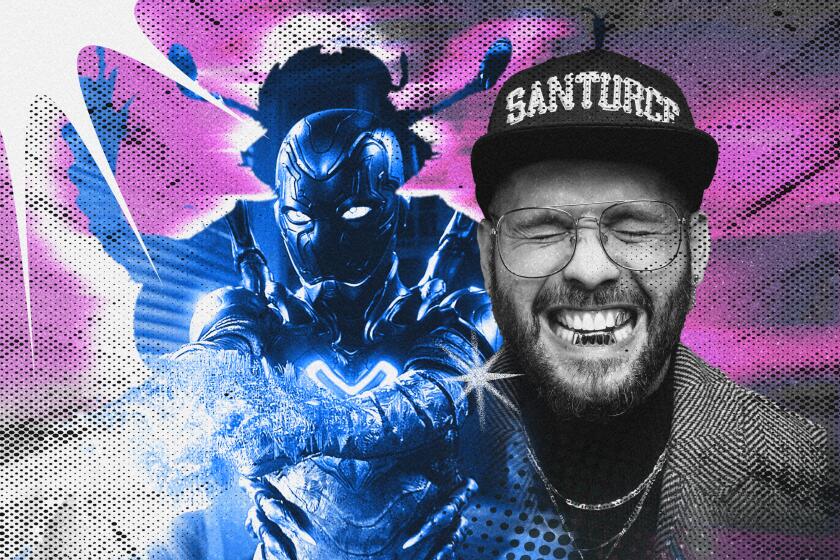As Latino actors and writers picket at Warner Bros., SAG-AFTRA leader says he asked studio to delay ‘Blue Beetle’

- Share via
More than 2,000 actors, writers and industry professionals joined the Latinx Writers Committee and SAG-AFTRA National Latino Committee to strike outside the Warner Bros. lot in Burbank on Friday morning.
The bicoastal picket also drew about 400 marchers in New York City.
The event coincided with Warner Bros.’ release of DC’s first Latino-led superhero movie, “Blue Beetle.” In the film, Jaime Reyes/Blue Beetle, played by Xolo Maridueña, takes a job at a wealthy CEO’s mansion to help his family, who’s losing their home amid gentrification-driven spikes in rent. The working-class themes of the film resonated with working actors on the picket lines.
SAG-AFTRA has approved a deal from the studios to end its historic strike. The actors were on strike for more than 100 days.
“We’re not all celebrities,” said Constance Marie, who starred in the show “George Lopez.” “Most of our unit is just working people, paycheck-to-paycheck, who are hustling and juggling multiple jobs.”
“I am very concerned that the big studios would rather let these movies come out and not have any of the performers talk about it, not support us in a way that would magnify the movies,” she said. “The big studios just keep dragging us on, in, I don’t know, the hopes of just having more corporate greed, which is not good for any labor union, not good for the economy, not for anybody.”
Duncan Crabtree-Ireland, SAG-AFTRA’s national executive director and chief negotiator, said he had asked Warner Bros. to delay “Blue Beetle’s” release until after the strikes.
“Obviously, they didn’t choose to do that and I think that’s unfortunate, but we’re going to be lifting those cast members up and really recognizing them for their unity and solidarity,” Crabtree-Ireland said.
Representatives for Warner Bros. and the Alliance of Motion Picture and Television Producers did not respond to requests for comment.
The 2023 writers’ strike is over after the Writers Guild of America and the Alliance of Motion Picture and Television Producers reached a deal.
WGA strike captain Danny Tolli said the date was “pure coincidence,” but the day’s significance was not lost on some.
While guild rules forbid WGA from promoting any content, Latinx Writers Committee Chair Christina Piña said, “We in spirit are definitely, as creatives, promoting and supporting and celebrating the hell out of ‘Blue Beetle’ because it’s the first superhero Latino film, that was not only created by and casted by, but crewed by all Latinos, so we want the film to do well. We want to make sure people are aware of it.”
Earlier this month, dozens of Latino Hollywood organizations signed an open letter encouraging the community to “amplify the work that countless Latino artists have worked so hard to create.”
Despite the support, the film is on track for a lower-than-projected opening weekend in the $25-million range.
Gareth Dunnet-Alcocer, who wrote “Blue Beetle,” was among those on the picket line. “Blue Beetle” is also the first superhero movie directed and written by Latinos.
‘Blue Beetle’ director Angel Manuel Soto talks about the movie’s Latinx roots, its music and the ongoing strikes.
The turnout was a beacon of hope for many attending actors, including Misha Gonz-Cirkl, who plays Teresa Mendez in Apple TV+’s “Swagger.”
“You feel like you’re alone out here. You really do,” Gonz-Cirkl said, her voice breaking. “And to see so many Latinos from Latin America, Central America, the Caribbean, come out here and be so proud … it makes your heart just grow a little bigger, because you know you’re not alone.”
It’s day 109 of the WGA strike and day 36 of the SAG-AFTRA strike, but thousands of Latino writers and actors said Friday that their determination to negotiate a fair deal with Hollywood studios has not dwindled.
“The energy is stronger than ever,” said Jorge Rivera, the event’s organizer and vice chair of the WGAW’s Latinx Writers Committee.
The picket event, which Rivera and Piña began planning soon after SAG went on strike, had Latino vendors, a flash mob led by Latinas Acting Up, and speeches from event organizers and special guests — including Edward James Olmos, the first Mexican American actor to receive a best actor Oscar nomination.
“Be ready for the long run,” Olmos told the crowd. “Do not think this is going to be done by the end of this month. God, it would be fantastic; please prove me wrong,” he said, gesturing toward the sky.
“We’re going to stay here until we win.”
Latinos, who comprise 19% of the U.S. population, bought 29% of movie tickets sold in 2020, according to a 2021 Motion Picture Association report. Still, a USC film study released Thursday shows only 5.2% of speaking characters in the top 100 films of 2022 were Hispanic or Latino.
“Latinos love to go to the movies. It’s part of our culture, how we’ve grown up,” said Frank Aragon, who’s been a SAG member since 1989. “And it’s so unfair that we see the most minimalist amount of us on screen.”
With studios already cutting back on content, Piña said she’s worried diversity gains from the last 10 years will be rolled back.
“What we want to do here today is remind the studios that we are a force to be reckoned with, and do not, in your contraction of content, take away opportunities for our community, as well as any other diverse community, whether Asian American or Black or Native American or disabled or LGBTQ,” Piña said.
“We want those opportunities because we know audiences will show up for that content — we have proven it over and over again,” she added. “Why do we still have to keep proving it?”
“We’re not going anywhere,” Rivera told the crowd. “Latinos know how to unionize, how to fight and how to win. We’re going to win.”
“Sí, se puede,” they chanted back.
Times staff writer Nicholas Ducassi contributed to this report.
More to Read
Inside the business of entertainment
The Wide Shot brings you news, analysis and insights on everything from streaming wars to production — and what it all means for the future.
You may occasionally receive promotional content from the Los Angeles Times.














